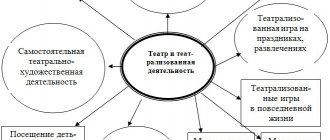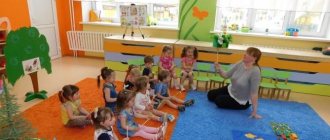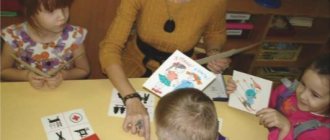Speech therapist in kindergarten
Svetlana Gogoreva
Speech therapist in kindergarten
Some parents, fortunately, do not even know why a speech therapist is needed in kindergarten . And parents of children with speech disorders had to come into close contact with the science of speech therapy and get acquainted with specialists in this field.
Speech therapy is the science of speech disorders, their overcoming and prevention through special correctional education and upbringing, which is one of the sections of special pedagogy - defectology, and is divided into preschool, school and adult. This article will mostly be devoted to preschool speech therapy . Speech therapy, which combines medicine, psychology and pedagogy, and without knowledge of the basics of these specialties, can be useless and sometimes “dangerous”
.
A kindergarten teacher-speech therapist is a multidisciplinary specialist who works with all types of speech disorders in preschool children.
What functions does a speech therapist perform in kindergarten ? A speech therapist in kindergarten conducts a complete and detailed examination of each child to determine the characteristics of his speech development. Most often this happens at the beginning of the school year, special examination protocols are used, the child’s medical record is studied, parents are interviewed, if necessary, the speech therapist can refer the child for consultation with an ENT doctor, ophthalmologist, neurologist, audiologist, speech pathologist. Ideally, a conclusion on speech The development of the child is determined collectively: by a speech therapist , a psychologist and a neurologist . And after this, the speech therapist , taking into account the characteristics of the child’s psyche and the severity of the speech defect, selects a speech correction program.
The speech correction program is carried out in stages, and in most cases, includes:
- formation of correct speech breathing,
- development of phonetic perception,
- normalization of speech motor skills,
-correction of sound pronunciation disorders,
- overcoming impairments and developing the lexical and grammatical aspects of speech,
- development of connected speech.
the speech therapist then teaches him the elements of literacy and prepares him for studying at a comprehensive school. The duration of the correction program depends on the severity of the speech disorder, the psychological and neurological status of the child, and on the professionalism of the speech therapist . Each lesson conducted by a speech therapist in kindergarten is a whole range of games and exercises, as well as various types of gymnastics and massages for children’s tongues. In classes, the speech therapist uses toys , pictures, musical instruments and a lot of various teaching aids. And the most important attribute of the classes is the mirror, in front of which most tasks are performed. has speech therapy instruments - probes for massage and sound production. A speech therapist in kindergarten regularly conducts not only frontal (classes with the whole group), but also subgroup and individual classes.
What speech disorders does a speech therapist correct in kindergarten ?
1. Impaired oral speech:
- dyslalia (tongue-tied)
– disturbance of sound pronunciation with normal hearing and preserved innervation of the speech apparatus;
-dysarthria – a violation of the pronunciation side of speech, caused by insufficient innervation of the speech apparatus;
-rhinolalia – disturbance of voice timbre and sound pronunciation caused by anatomical and physiological defects of the speech apparatus;
- stuttering is a violation of the tempo-rhythmic organization of speech, caused by the convulsive state of the muscles of the speech apparatus;
-bradylalia – pathologically slow rate of speech;
-tachylalia - pathologically accelerated rate of speech;
-alalia is the absence or underdevelopment of speech due to organic damage to the speech areas of the cerebral cortex in the prenatal or early period of a child’s development.
In addition to problems with oral speech, children suffer from a written language disorder, which is corrected at school.
2. Violation of means of communication:
-FNR – phonetic speech underdevelopment. This is a violation of sound pronunciation with normal physical and phonemic hearing and the normal structure of the speech apparatus. There may be a disorder of a single sound or several sounds at the same time. Such disorders may manifest themselves:
• in absence (omission)
sound - aketa instead of rocket
• in distortions - throaty pronunciation of the sound r, buccal pronunciation - sh, etc.
Incorrect pronunciation can be observed in relation to any consonant sound, but less often those sounds that are violated are those that are simple in the method of articulation and do not require additional movements of the tongue (m, n, p, t; most often violated:
- whistling sounds - S, Z (and their soft pairs, C;
-hissing sounds – Ш, Ж, Х, Ш;
- sonorant (lingual)
– L, R
(and their soft pairs)
;
-rear lingual – K, G, X (and their soft pairs)
.
Most often, a speech therapist in kindergarten takes children with FND for six months.
-FFNR - phonetic-phonemic speech underdevelopment. This is a violation of the processes of formation of the pronunciation system (native)
language in children with various speech disorders due to defects in the perception and pronunciation of sounds.
With intact physical hearing, children cannot distinguish or confuse similar sounds (whistling and hissing; sonorant; soft and hard; voiced and dull)
.
For example, when asked to repeat a number of different sounds or syllables , the child repeats all sounds or syllables as the same (pa-pa-pa instead of pa-ba-pa)
.
And, when a speech therapist in kindergarten asks what sounds he hears? The kid replies that the sounds are the same. It is not physical, but phonemic hearing (hearing for phonemes)
. And, as a result of a number of reasons, it turns out to be disturbed or unformed.
A phoneme is the minimum unit of sound structure of a language. Each phoneme in speech is represented by its own variants (allophones)
. A phoneme has a main variant - a sound in a strong position: for vowels - this is the position under stress, for consonants - the position before the vowel or sonorant.
Several conditions are identified in the phonetic-phonemic underdevelopment of children:
• difficulties in analyzing sounds that are disturbed in pronunciation;
• with formed articulation, inability to distinguish sounds belonging to different phonetic groups;
• inability to determine the presence and sequence of sounds in a word.
The main manifestations characterizing FFNR:
1. Undifferentiated pronunciation of pairs or groups of sounds, i.e. the same sound can serve as a substitute for two or more sounds for a child. For example, instead of the sounds “s”
,
“ch”
,
“sh”
the child pronounces the sound
“s”
:
“syumka”
instead of
“bag”
,
“syasya”
instead of
“cup”
,
“syapka”
instead of
“hat”
.
2. Replacement of some sounds with others that have simpler articulation, i.e. complex sounds are replaced by simple ones. For example, a group of hissing sounds can be replaced by whistling sapka instead of hat, “r”
is replaced by
"l"
laketa instead of rocket.
3. Mixing of sounds, i.e. unstable use of a number of sounds in different words. A child can use sounds correctly in some words, but in others replace them with similar ones in articulation or acoustic characteristics. For example, a child can correctly pronounce the sounds “r”
,
“l”
and
“s”
in isolation (i.e. one sound, not in a syllable or word, but in speech utterances instead of
“red cow”
he says
“lyzaya kalova”
.
In addition to the listed features of pronunciation and phonemic perception, children with FFDD exhibit: general blurred speech, unclear diction, some delay in the formation of vocabulary and grammatical structure of speech (errors in case endings, use of prepositions , agreement of adjectives and numerals with nouns).
A speech therapist in kindergarten children with such a speech disorder for correctional classes throughout the year.
-ONR – general speech underdevelopment. As the name suggests, with this type of disorder, all components of the speech system, that is, the sound side (phonetics)
– violation of sound pronunciation and phonemic perception;
semantic side (lexis, grammar)
- poor vocabulary, few generalizations, synonyms, antonyms, etc., errors in inflection and word formation, difficulties in coordinating words; poor development of coherent speech - the ability to tell and retell.
Children with OHP are characterized by:
•later onset of speech: the first words appear by 3-4 years, phrasal speech of two words by 5 years;
• speech is full of agrammatisms (irregular forms and variants of words)
and not sufficiently phonetically designed;
• expressive speech lags behind impressive speech, that is, the child, while understanding the speech addressed to him, cannot correctly voice his thoughts;
• the speech of children with ODD is difficult to understand.
Most often, when talking about ODD, they mean speech disorders in children with normal intelligence and hearing. The fact is that with hearing or intellectual impairments, speech underdevelopment, of course, occurs in most cases, but in this case, OHP already has the character of a secondary defect.
The formation of correct speech development is a complex process - it requires the joint work of a doctor - a neurologist, speech therapist , psychologist, educator, music worker, and physical education specialist. This work must be coordinated and comprehensive. By actively influencing the child with specific professional means, teachers build their work on the basis of general pedagogical principles. At the same time, by identifying objectively existing points of contact between various pedagogical areas, each teacher does not carry out his work in isolation, but complementing and deepening the influence of others. Therefore, taking into account the individual characteristics of each child with speech impairments, preschool education specialists outline a unified set of joint correctional and pedagogical work aimed at the formation and development of the motor, intellectual, speech and social-emotional spheres of personality development of a preschool child.
And at the end of my work, I would like to say that parents play an equally important role in the speech development of children. Therefore, in addition to classes with the child, the speech therapist in the kindergarten provides consultations to parents, during which he explains to the parents the child’s speech defect and teaches the necessary techniques and exercises for homework.
Thank you for your attention!
Features, pros and cons of the profession of speech therapist
“In their work, a specialist needs to show great patience and restraint,” notes teacher-speech therapist Vita Bilukha. — It is important to have goodwill, communication skills, and intuition. Observation and perseverance, flexibility of mind are required. After all, often the presentation of material has to be rearranged on the fly: you expect one thing, but have to work with another.”
One of the main difficulties of the profession is the need to work with “difficult” children. Without a sincere desire to help, to go through a long path of correction step by step, patience - it is very difficult to cope with the psychological load. Another significant disadvantage is the huge number of documents that a specialist must maintain when working in a budget institution. They either get used to this or go into private practice, where the specialist determines the scope of reporting for himself.
How many hours does a speech therapist work?
The standard work rate in a budget institution is 20 hours a week, that is, a speech therapist works 4 hours a day. This is one of the advantages of the profession: such a schedule allows you not to get tired or overloaded. There is always time left for personal matters, and if you wish, you can engage in private practice in your free time.
How long is a speech therapist's vacation?
Long vacations are another plus of the profession. Its duration is 56 days. And since specialists work in schools or kindergartens, where the educational process lasts from September to May, vacations always fall only in the summer months, which is also convenient.
pixabay.com/
How much does a speech therapist earn?
The salary level does not differ from the usual in the public sector. Depending on the region and place of work, a specialist can count on 17–20 thousand rubles per month. The average salary of a speech therapist in a school is usually higher than in a kindergarten.
“A speech therapist has no career growth as such,” clarifies Vita Bilukha. “But now more and more specialists are going into private practice. Those who have self-discipline and organizational character can achieve good results. In this case, the specialist himself sets the hourly wage.”
According to the expert, only those who like to feel the usefulness of their work and who want to help people become healthier and happier can successfully realize themselves in the profession. And only in second place in importance should come short working hours and long vacations. In this case, the person will enjoy his work.







